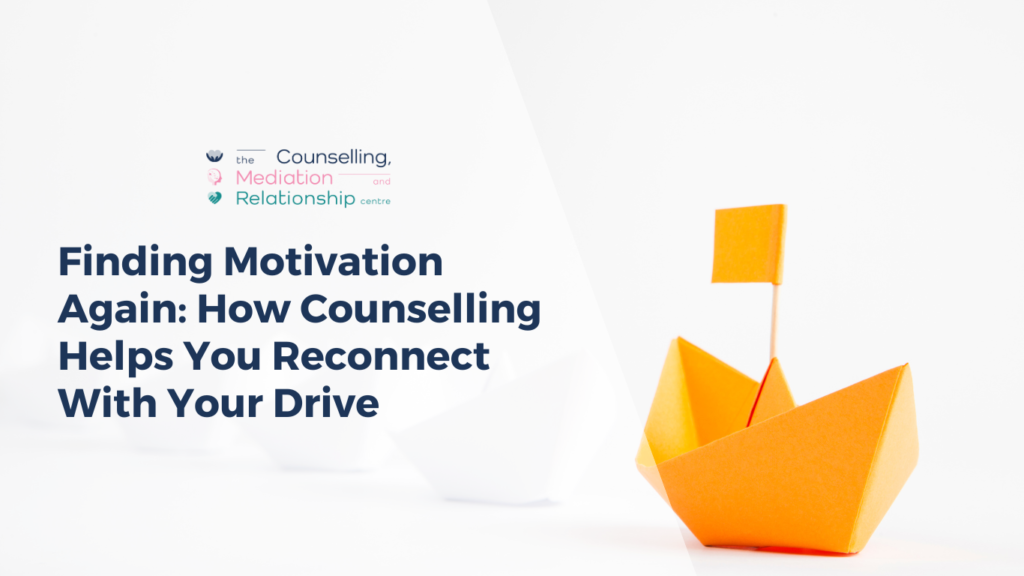Finding Motivation Again

Finding Motivation Again: How Counselling Helps You Reconnect With Your Drive
Motivation can feel unpredictable. Some days, you wake up ready to take on the world. Other days, even simple tasks feel overwhelming. You might start a new routine full of energy, then lose momentum a few weeks later. This pattern is more common than many people realise and it’s not a sign of weakness or laziness. It’s a signal that something deeper needs attention.
Counselling provides a safe space to explore why motivation feels out of reach. By understanding what’s holding you back, you can learn how to create motivation that lasts.
Understanding Why Motivation Fades
Motivation is often linked to how we respond to pressure, expectations, and stress. From an early age, many of us learn to depend on external encouragement praise from parents, grades from teachers, or recognition from managers. While external rewards can feel uplifting, they rarely lead to long-term satisfaction. Once the praise stops, so does the drive.
When motivation depends on approval, self-doubt begins to grow. You might start asking yourself questions like “Am I doing enough?” or “What if I fail?” Over time, that pressure can turn into avoidance, fatigue, or burnout.
True motivation builds from within. It grows when your actions align with your personal values when you do something because it’s meaningful, not because you “should.” Counselling helps you identify those values and reconnect with the parts of yourself that already know what matters most.
The Emotional Side of Motivation
Losing motivation can feel confusing, but it’s often a response to emotional strain. Stress, perfectionism, self-criticism, or past experiences can quietly drain your energy. You might notice patterns such as:
- Constant fatigue, even with enough rest
- Difficulty focusing on work or study
- Guilt when you’re not being “productive”
- Comparing yourself to others and feeling behind
- A loss of interest in things you used to enjoy
These signs show that your nervous system is overwhelmed. Counselling helps you slow down and understand what your mind and body are trying to communicate, so you can rebuild motivation from a calmer, clearer place.
How Counselling Helps You Rebuild Motivation
Counselling doesn’t give you motivation it helps you find where it went. Many people discover that their lack of drive isn’t about laziness. It’s about emotional exhaustion, self-pressure, or beliefs formed long ago that no longer serve them.
In counselling, you work with a professional who helps you:
- Understand what triggers loss of motivation and why it happens
- Recognise patterns of perfectionism or people-pleasing that drain energy
- Learn practical tools for emotional regulation and focus
- Reconnect with your personal goals and values
- Build self-trust and confidence to act without external approval
Motivation starts returning naturally when you stop fighting yourself and begin working with yourself. Counselling gives you the space and guidance to do exactly that.
Small Changes That Support Motivation
While counselling provides deep insight, small everyday habits also make a difference. Try to:
- Create simple, realistic routines that match your energy levels
- Set small, achievable goals to regain a sense of progress
- Take short breaks instead of pushing through exhaustion
- Speak kindly to yourself when motivation dips
- Reflect regularly on what feels meaningful to you
You don’t need to overhaul your life to feel motivated again. Small steps are enough to rebuild momentum.
When to Consider Counselling for Motivation
You might benefit from counselling if you notice that:
- You feel stuck despite trying to stay positive
- You keep starting projects but struggle to finish
- You rely heavily on others for encouragement
- You experience guilt or shame when resting
- You want change but don’t know where to start
Counselling provides structure and emotional support as you rebuild motivation in a sustainable way.
Frequently Asked Questions
- How does counselling help with motivation loss?
Counselling helps you explore the emotions and thought patterns that block motivation. It focuses on understanding your triggers and developing strategies to reconnect with your goals and values. - Is loss of motivation a sign of depression?
Not always. Many people experience temporary loss of motivation due to stress, fatigue, or burnout. However, if you also feel ongoing sadness, loss of pleasure, or hopelessness, it may be helpful to discuss this with a counsellor or GP. - What if I’ve tried motivating myself and nothing works?
Self-help strategies often focus on willpower, which doesn’t address deeper emotional causes. Counselling provides personalised support to understand what’s underneath the lack of drive and helps you rebuild it from the inside out. - How long does it take to feel motivated again?
Everyone’s journey is different. Some people notice improvement after a few sessions, while others take more time. What matters most is consistency and a willingness to reflect and grow. - Do I need counselling if I’m not in crisis?
Yes. You don’t need to be in crisis to seek counselling. Many people find counselling helpful for self-development, reflection, and learning tools to improve daily motivation and resilience.
Finding Your Energy Again
Motivation isn’t something you have or don’t have it’s something you build through awareness and self-understanding. When you slow down and listen to yourself, your natural drive begins to reappear. Counselling supports that process by helping you see what’s blocking your energy and teaching you how to work through it with care.
If you’re ready to feel motivated again, consider speaking with a counsellor. Together, you can explore what’s been holding you back and take steady, confident steps toward the life you want to build.
Book an Appointment
📍 Visit us at: Shop 2/44 Ulong St, Griffith NSW 2680
📧 Email: donna@griffithcounselling.com
Take the first step toward caring for your well-being today. Reach out to schedule an appointment and begin your journey to a more balanced, fulfilling life.

 Previous Post
Previous Post